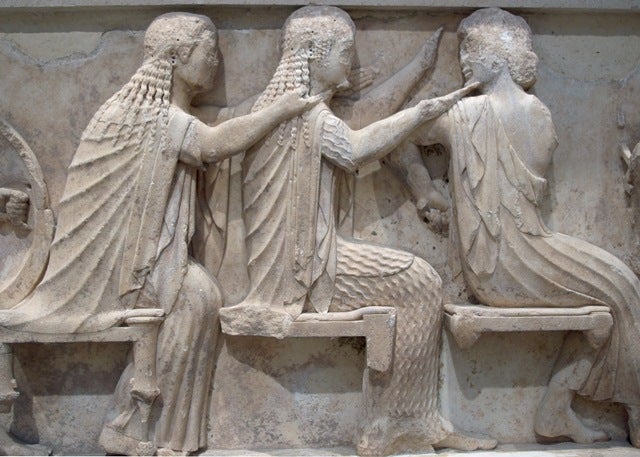
When ancient Greeks were seeking guidance on matters of life and death, they turned to the oracle in Delphi. Modern Greeks do the same. At the end of February 2016, an economic conference bringing together a true "who-is-who" of local and global actors and thinkers on the Greek economy met at the site of the former temple of Apollon north-west of Athens to grapple with the existential threats that Greece is facing today.
Even though the economic crisis seems to have mostly disappeared from newspaper headlines, Greece has far from escaped the crisis: Greek “anchored poverty” rates, i.e. the share of the population with an income below 60% of the median income, rose from 20 percent to an incredible 46 percent between 2008 and 2012 (the last year for which we have reliable data). Given that the recession has continued since then, my best guess is that the anchored poverty rate is now likely hovering around half of the population, by far the highest in the EU.
After the turbulences caused by elections and referenda in Greece in 2015, the Delphi conference was based on an optimistic premise: provided Greece implements the current reform program it has committed herself to, economic growth could return at the end of 2016.
But just when you thought it couldn’t possibly get any worse, think again: the Syrian refugee and migration crisis hit, and it is hitting Greece hard. The country has been receiving 1000-2000 refugees and migrants on a daily basis, and as many as 7000 per day in October of last year, mainly from Turkey via the Aegean Sea. Most panels in Delphi ended up being dominated by this topic.
Greece's institutions and programs are perennially weak and overwhelmed with the implementation of a whole array of reforms. They now also have to deal with a huge number of traumatized families escaping a brutal war plus other desperate people who are joining the trek in order to seek greener pastures in Europe. It is truly an extraordinary emergency situation for Greece and for Europe as a whole.
But as the Austrian ex-Chancellor Wolfgang Schuessel aptly pointed out at Delphi: we can expect this to be the test case for the new normal rather than an exceptional event. Add climate change, high unemployment, inequality and demographics to the long list of conflicts surrounding Europe and you don’t have to be the oracle at Delphi in order to predict increasing migration pressures in the coming decades. And it is also safe to say that Greece will continue to be a popular entry point into Europe.
So what to do?
Despite those troubling medium to long term horizons, Greece has no choice but to do both: help Europe deal with the refugee and migration crisis as part of a broader set of actions which the Union is now working on, and at the same time overcome her own domestic economic crisis.
The latter means opening the economy, protecting the poor and vulnerable more effectively and finding a path to sustainable growth and job creation. The World Bank has been requested by Greece to help - with generous financial support from the European Commission - with technical assistance in the area of investment climate reform, simplification of procedures for private sector investment, introduction of a targeted social safety net and reviewing the overall social welfare system.
But is there a link between the two? Do the refugee crisis and the economic growth potential of Greece have anything in common?
Of course they do: location, location, location!
The reason why refugees and migrants are coming via Greece into the EU is because the country is geographically the Southeastern gateway into the largest and richest market in the world. Paradoxically however, the country currently underutilizes this natural comparative advantage on the economic front: transport routes for the increasing trade between ‘factory Asia” and ‘factory Europe’ touch Greece only briefly at the port of Piraeus, but then continue into the other European ports such as Rotterdam and Hamburg.
Only a meager 1.3 percent of all containers arriving in Piraeus, the deep water seaport in Europe closest to the Suez Canal, are transferred to railway and find their way into the Greek market and beyond. We estimate that, provided the right measures are taken, Greece could increase that share of inward-oriented container traffic tenfold by 2020.
For that to happen – among other things - the Greek logistics industry needs to be modernized and expanded; the already existing Framework Law, a product of a public-private partnership with technical support from a World Bank team, needs to be implemented; a railway corridor strategy into the EU market needs to be developed and implemented; the Thessaloniki-Piraeus rail line needs to be electrified, a long overdue investment project, etcetera.
The lesson therefore is, that Greece must make much better use of its geographic location and turn what currently looks more of a risk into an opportunity and truly become the Southeastern gateway into Europe for trade flows from Asia as well as from its own economy, as it gradually opens its economy and increases its production and exports.
That’s at least a sign of hope in what otherwise appears to be a very challenging situation in Greece.


Join the Conversation